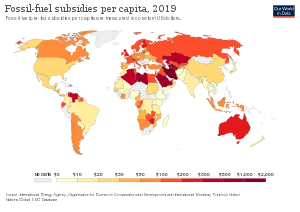
Back دعم الوقود الأحفوري Arabic Dotace na fosilní paliva Czech Subsidios a los combustibles fósiles Spanish Fiscalité noire French Հանածո վառելիքի սուբսիդիաներ Armenian Fossiele subsidies Dutch Dotácie na fosílne palivá Slovak 化石燃料補貼 Chinese


Fossil fuel subsidies are energy subsidies on fossil fuels, and in 2023 totalled over 1 trillion US dollars. They may be tax breaks on consumption, such as a lower sales tax on natural gas for residential heating; or subsidies on production, such as tax breaks on exploration for oil. Or they may be free or cheap negative externalities; such as air pollution or climate change due to burning gasoline, diesel and jet fuel. Some fossil fuel subsidies are via electricity generation, such as subsidies for coal-fired power stations.
Eliminating fossil fuel subsidies would reduce the health risks of air pollution,[1] and would greatly reduce global carbon emissions thus helping to limit climate change.[2] As of 2021[update], policy researchers estimate that substantially more money is spent on fossil fuel subsidies than on environmentally harmful agricultural subsidies or environmentally harmful water subsidies.[3] The International Energy Agency says: "High fossil fuel prices hit the poor hardest, but subsidies are rarely well-targeted to protect vulnerable groups and tend to benefit better-off segments of the population."[4]
Despite the G20 countries having pledged to phase-out inefficient fossil fuel subsidies,[5] as of 2023[update] they continue because of voter demand,[6][7] or for energy security.[8] Global fossil fuel consumption subsidies in 2022 have been estimated at one trillion dollars;[4] although they vary each year depending on oil prices, they are consistently hundreds of billions of dollars.[9]
- ^ "Local Environmental Externalities due to Energy Price Subsidies: A Focus on Air Pollution and Health" (PDF). World Bank.
- ^ "Fossil fuel subsidies: If we want to reduce greenhouse gas emissions we should not pay people to burn fossil-fuels". Our World in Data. Retrieved 4 November 2021.
- ^ "Protecting Nature by Reforming Environmentally Harmful Subsidies: The Role of Business | Earth Track". www.earthtrack.net. Retrieved 7 March 2022.
- ^ a b "Fossil Fuels Consumption Subsidies 2022 – Analysis". IEA. 16 February 2023. Retrieved 16 February 2023.
- ^ "Update on recent progress in reform of inefficient fossil-fuel subsidies that encourage wasteful consumption" (PDF). 2021.
- ^ George, Johannes Urpelainen and Elisha (14 July 2021). "Reforming global fossil fuel subsidies: How the United States can restart international cooperation". Brookings. Retrieved 26 February 2022.
- ^ Martinez-Alvarez, Cesar B.; Hazlett, Chad; Mahdavi, Paasha; Ross, Michael L. (22 November 2022). "Political leadership has limited impact on fossil fuel taxes and subsidies". Proceedings of the National Academy of Sciences. 119 (47): e2208024119. Bibcode:2022PNAS..11908024M. doi:10.1073/pnas.2208024119. ISSN 0027-8424. PMC 9704748. PMID 36375060.
- ^ Brower, Derek; Wilson, Tom; Giles, Chris (25 February 2022). "The new energy shock: Putin, Ukraine and the global economy". Financial Times. Retrieved 26 February 2022.
- ^ Cite error: The named reference
:5was invoked but never defined (see the help page).